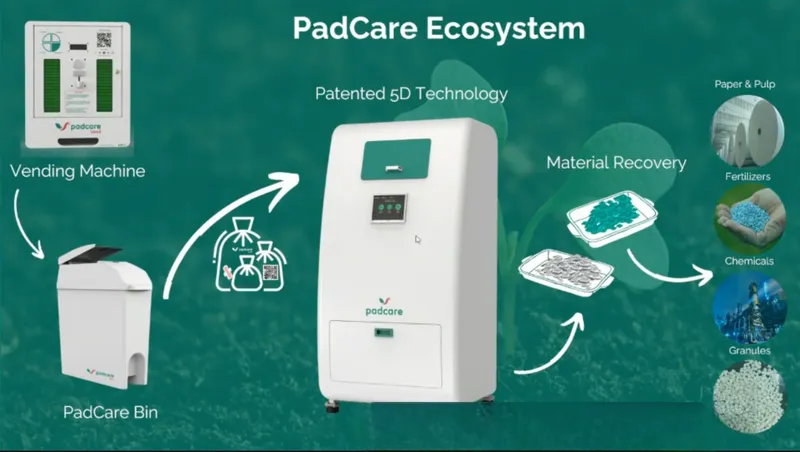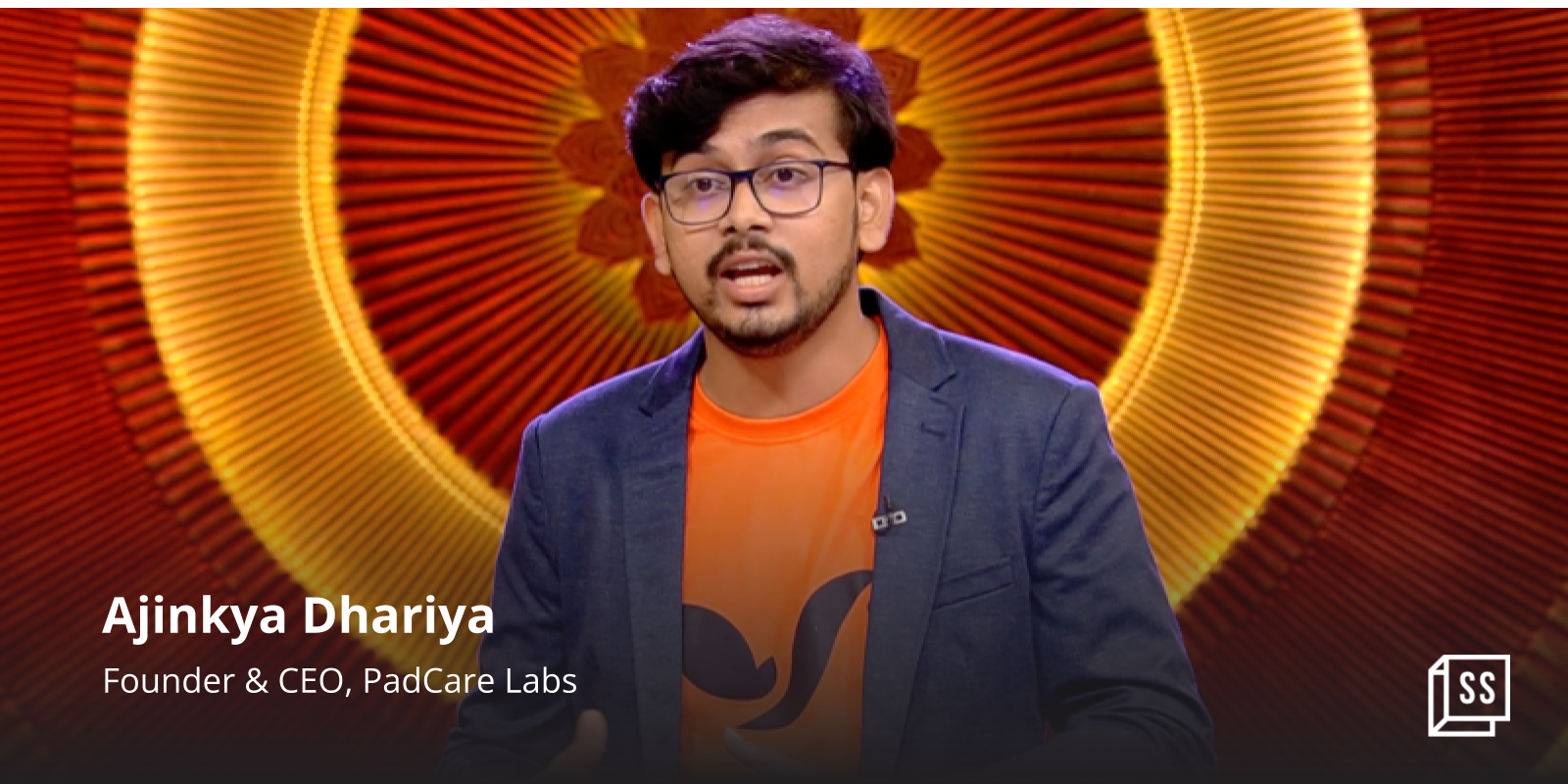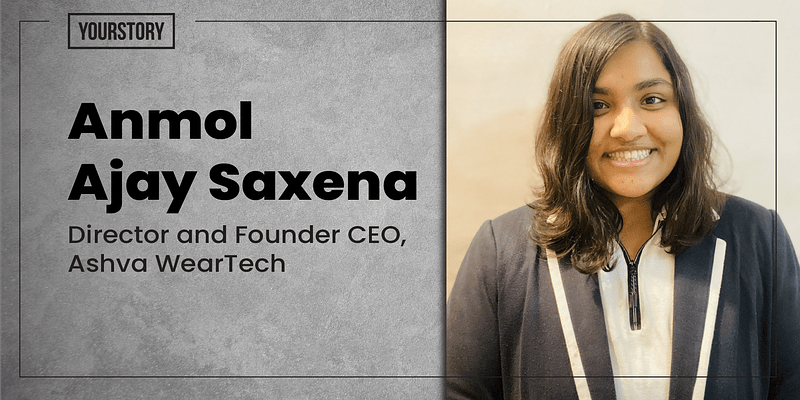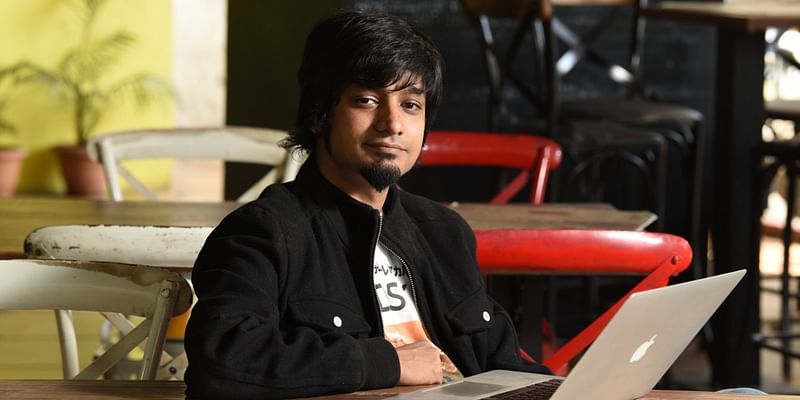This mechanical engineer has developed the world’s first disposal and recycling system for sanitary pads
PadCare Labs, founded by Ajinkya Dhariya in 2018, offers an all-round solution for sanitary waste disposal sanitary bins, a recycling system and products made the residue after recycling. It recently raised Rs 1 crore on Shark Tank India.
Seeing ragpickers segregate used sanitary napkins and diapers from other waste with their bare hands moved Ajinkya Dhariya to set up , an ecosystem that provides an end-to-end solution for sanitary waste disposal.
India generates around 3.37 lakh tonnes of waste from sanitary napkins and baby diapers, where not even 50% of women use sanitary napkins. A sanitary pad may take up to 500-800 years to decompose.
In most cities, waste is still not segregated, which means municipal workers have to sift through all kinds of garbage and remove the sanitary pads, often without gloves, under unhygienic conditions. In certain states, male workers refuse to pick up the sanitary waste. Also, more than 113,000 tonnes of used sanitary napkins reach India’s landfills every year.
An all-round solution to sanitary waste

The PadCare ecosystem
Hailing from a small village, Masa, in Maharashtra’s Raigad district, Dhariya was part of an ISRO project for a company in Pune when he saw how ragpickers were forced to handle the sanitary waste. Taken aback by this sight, he called his mother and asked her how she disposed of used sanitary napkins. She replied that she’d wrap them in newspaper and throw them in the trash bin.
“That’s when I realised that there needs to be a solution not just for the disposal of waste. The only alternative available was incineration which releases harmful toxins into the air, contributes to air pollution and comes at a recurring cost,” Dhariya tells SocialStory.
It needed an all-around intervention– from the collection of waste, recycling and then using the by-products as raw materials for diverse industries led to the formation of PadCare Labs in 2018, a Pune-based startup that provides an end-to-end solution for sanitary waste disposal.
Four years ago, Ajinkya’s initial thought was to develop a machine to be installed in washrooms where women can dispose of the pad at the source.
“We implemented this in 2019 to check its feasibility and we observed was that the women just wanted to get rid of the pads–not bothered about recycling or incineration. My first dream was to have a small unit that could be installed in washrooms where processing could happen in a decentralised way. Indian washrooms are quite compact, and most of the time there is no water. And this solution would come at a high recurring cost,” Dhariya points out.
Along with sanitary napkin vending machines, the company developed PadCare bins to be installed in washrooms, where used sanitary waste could be collected and stored for up to 30 days and still remain free of odour and bacterial growth.
These are then collected and transported to a centralised unit, the PadCare X which claims to be the world-first 5D technology-based sanitary napkin disposal and recycling system.
“After four years, and more than five thousand plus failure trials in terms of process development, we launched this technology 18 months ago and with a capacity of 100 kg and right now we are starting soon 1.5 metric tonnes processing capacity at Pune,” Dhariya says.
Right now, there are 6,000 PadCare bins installed free of charge at 250 clients’ offices across India and 1.5 tonnes of pads are processed every day at the two central processing units in Pune. These clients include Meta, Capgemini, TCS, Goldman Sachs and other large corporate houses.
“A third-party team travels to individual client locations to pick up the waste, and they are brought to the nearest material recovery centre where it’s recycled, with pulp and plastic as output. The plastic is converted into granules, which can be used to make the PadCare bins. The pulp is sold to the fertiliser industry for different applications,” he explains.
In fact, PadCare Labs makes decorative items and stationery out of the pulp, making the process circular and cost-effective. In the interview with SocialStory, Ajinkya held up a small diary, and calendar–products available on its store on Shopify.
Ajinkya now plans to install these PadCare units in Bengaluru and New Delhi.
Apart from the right disposal of sanitary waste, PadCare Labs aims to contribute to the socio-economic aspect of menstrual hygiene management. This would mean reaching out to rural communities to be a part of the solution.
“We are looking at a top-to-bottom strategy where we are first focussing on commercial buildings, colleges, and workplaces. We have started our pilots in residential societies in Bengaluru and Mumbai. We are also exploring smaller towns like Mahabaleshwar, Baramati, and Navi Mumbai,” he elaborates.
Community-level approach
As PadCare scales, it aims to provide the units on a micro-entrepreneurship model in Tier II, and III cities.
“Our community-level approach would include a joint collaboration with local government bodies and self-help groups who can buy the machines and make an income from the output.
In this case, instead of the 1.5-tonne machine, Ajinkya is looking at a lower capacity, like 200 kg that would bring the price down to a couple of lakhs that women SHGs can buy by availing a bank loan.
PadCare has received a number of government grants from organisations including Niti Aayog, the Department of Biotechnology, and also under the Swachh Bharat programme.
“We are working closely with the Ministry of Environment to come up with clear and transparent guidelines around sanitary napkins disposal, technology for recycling and waste management. We have received considerable support from government agencies for technological approval, guidelines and to set up the standard operating process,” he says.
In 2020, PadCare Labs raised an undisclosed amount in its pre-seed funding round from the technology startup incubator Venture Center under BIRAC’s LEAP Fund. This year, it raised Rs 5 crore in a seed funding round from Social Alpha, Lavni Ventures, 3i Partners, Rainmatter, and Spectrum Impact.
But the startup shot into the limelight after it pitched on the second season of Shark Tank India. One of the Sharks, Peyush Bansal (founder, Lenskart) offered Ajinkya an open offer, making the pitch go viral. His ask was Rs 50 lakh for 2% equity but he received a four-Shark deal for Rs 1 crore at 4% equity.
“The interest to pitch on Shark Tank was very clear–the platform reaches millions of people. The idea was also to break the taboo around menstrual hygiene management. It’s not just restricted to women; it’s a community issue and we need to raise awareness on its unfortunate impact on the environment and work towards sustainability,” Dhariya says.
He went on the show hoping to get Namita Thapar and Peyush Bansal to invest in the business. But, is happy to have four Sharks on board.
“Namita runs a pharmaceutical company and has invested in Menstrupedia before. Aman Gupta, Vinita Singh and Peyush Bansal (the other Sharks) come with their own expertise in different domains. I consider it a win-win situation,” he adds.
Last month, the startup closed a Rs 5 crore seed funding round led by Social Alpha with strategic investments from Lavni Ventures, 3i partners, Rainmatter, and Spectrum Impact.
PadCare Lab’s plan includes scaling operations in Tier I cities like Pune, Mumbai, Bengaluru, Delhi, and Hyderabad and entering Tier II cities like Ahmedabad, Indore, Kochi, and Nagpur while deploying material recovery facilities across more cities in India. It also plans to go global by exploring markets in Canada, Singapore, and the UK.
Edited by Affirunisa Kankudti









![[Funding alert] Edtech startup Vedantu raises $12.56M from Legend Cap, Ohana Holding](https://images.yourstory.com/cs/2/b87effd0-6a66-11e9-ad33-3f8a4777438f/Imagedsk31567099489336.jpg)

